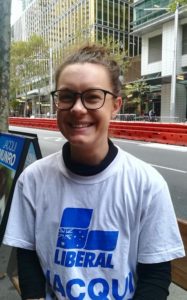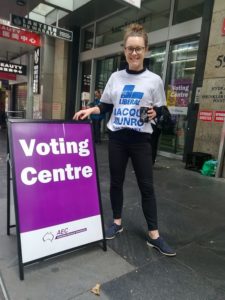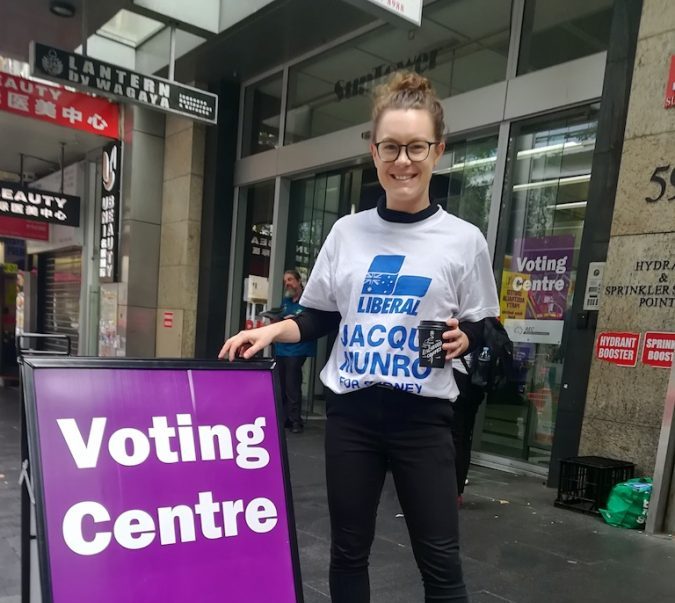
It’s early Friday morning, but Jacqui Munro is up and running: running in an oversized campaign T-Shirt with her own name on it, a cup of coffee in hand. A campaign volunteer is worried that she didn’t have breakfast yet, but Munro doesn’t mind. She is the 28-year-old Liberal candidate for the electorate of Sydney.
On her way to the pre-polling station Munro listened to Drum and Bass, a quick-paced genre of electronic music with between 160–180 beats per minute. Her ears are accentuated by little clef earrings. “I really love music”, she says. “I love getting out and having a dance.”
She’s firmly against the lockout laws, and not afraid to go against party line if she believes it is wrong.
“I know people who lost their jobs and had to shut down their clubs,” she says. “They faced unemployment through something that the government imposed, and I thought that wasn’t right.”
Munro believes in liberalism and that people should be allowed to live their lives however they want. “I think that the Liberals are best placed to manage the economy,” she says, and that innovation and enterprise needs to be rewarded, especially in small businesses. People who run them “are the people who actually create our city” she said.
Munro’s face lights up when she speaks about Sydney: “There is no place else I would rather represent.” She calls it her home, sees herself as a product of this city, and running here is a privilege.
“Sometimes, I am like… oh my gosh, I can’t believe I was endorsed,” she says. She’s up against Tanya Plibersek, who holds a comfortable 11 per cent margin. When confronted with that fact, Munro bursts out laughing. Steve Bradbury, the Australian speedskater who accidentally won at the winter Olympics is her great Australian hero – not because he was lucky, but because he tried and put in the hard work. “Do your best. It’s a pretty worthwhile goal.” She’s not necessarily running to win but to give people a choice.

It’s a slow pre-polling day but she and her volunteers hand out leaflets to whoever is willing to take them. Her volunteers are predominantly women, but otherwise a healthy mix of ages and racial backgrounds. Is Munro a feminist? When asked this question, she hesitates: “I wouldn’t mind calling myself a feminist. I guess I just wouldn’t necessarily put a label on it.”
She believes in equality and that barriers for women need to be addressed but says she personally has never had problems – even within the Liberal party. Labels are not her thing. Even though she describes herself as a young bisexual woman, her sexuality to her “just happens to be a part of who I am”.
At the same time, representation and having role models is something she finds important – more important, than, for example, bringing back the Safe Schools program. She struggles to find the right words to speak about the program. It’s not “the overall goal of safe schools to provide an accepting and respectful environment and ideally with education behind it” that she struggles with – she thinks that is reasonable. Munro is just unsure about when we should “start talking to young people about sexuality and gender”. She is a Liberal after all but she hopes “that people see there is diversity within the Liberal party as well”.
“The things that unite us are much stronger than what divides us and so many issues don’t go down party lines,” she says. That is a lesson she learned working on the Yes-Campaign for Marriage Equality. It was more important to speak to people and appeal to their sense of humanity and fairness to be successful.
Over the course of the interview, more volunteers appear, making Munro jump up from where she is sitting, hugging and greeting everyone like friends or family members. One offers to get her breakfast: Munro declines – she’s off to her next appointment for the day in a few minutes, anyway.


